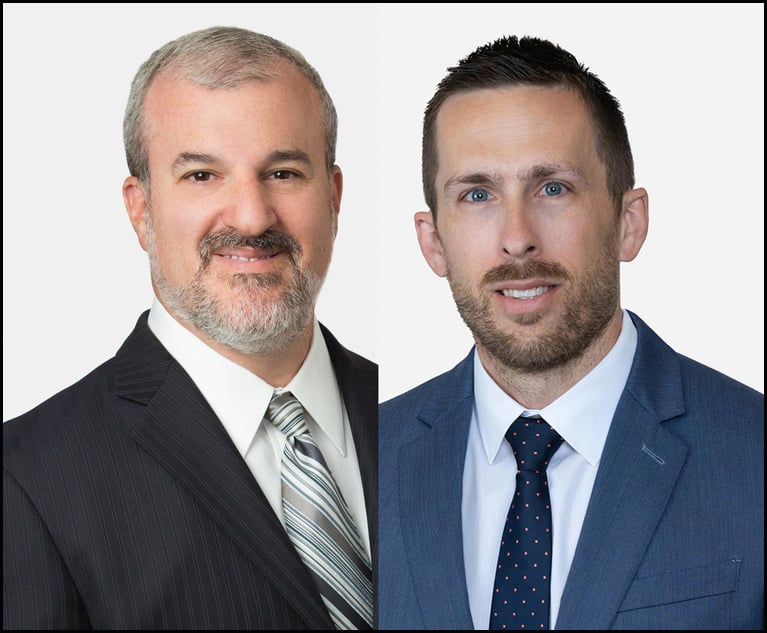Church and State: Determining Ownership of Church Property After Schism
"The line between ecclesiastical and corporate functions was once again before the Supreme Court of Texas in The Episcopal Diocese of Fort Worth v. The Episcopal Church, when it was again asked to determine ownership of church property after a schism. Can the civil courts hear the dispute, or is this within the exclusive purview of the ecclesiastical hierarchy?" writes Dykema Gossett's David B. West.
June 30, 2020 at 05:30 PM
9 minute read

PINCA religious entity is a unique creature: first, an ecclesiastical entity with its doctrinal matters or tenets of the faith protected under the First Amendment; but also a corporate entity, created under the laws of the state and therefore subject to it strictures. The line between ecclesiastical and corporate functions was once again before the Supreme Court of Texas in The Episcopal Diocese of Fort Worth v. The Episcopal Church, __ _S.W.3d __ (Tex. 2020), when it was again asked to determine ownership of church property after a schism. Can the civil courts hear the dispute, or is this within the exclusive purview of the ecclesiastical hierarchy?
Constitutional Standard
The U.S. Supreme Court, in Jones v. Wolf, 443 U.S. 595 (1979), identified three approaches to resolving church property disputes:
- The departure from doctrine approach, which requires courts to award property to whichever faction of the church adheres to the "true standard of faith;"
- the deference to hierarch approach, which requires courts to defer to and enforce the decision of the highest authority of the ecclesiastical body; and
- the "neutral principles of law" approach, which allows courts to settle church property disputes by examining the same secular documents that it would consider in a secular dispute. The Court in Jones rejected the "departure-from-doctrine approach," known as the "English Rule," as contrary to the First Amendment. It allowed each state to adopt other approaches so long as it involved no consideration of doctrinal matters or tenets of the faith.
Texas Adopts Neutral Principles Standard
Reviewing two church property disputes in 2013, the Texas Supreme Court adopted the "neutral principles of law standard," holding that a state court could determine ownership of church property by examining
- The deeds to the property;
- the local church charter;
- state statutes, such as the Texas Trust Code; and
- the constitution of the general church, or denomination.
Masterson v. Diocese of Nw. Tex., 422 S.W.3d 594 (Tex. 2013). In the companion case, Episcopal Diocese of Fort Worth v. The Episcopal Church, 422 S.W.3d 646 (Tex. 2013), the court remanded the case to the trial court to review the evidence in accordance with the neutral principles of law approach considering the same documents.
Diocese Property
Seven years later, the Texas Supreme Court issued its 8-0 decision to address the issue of which faction in a church dispute was the "The Episcopal Diocese of Fort Worth" (the "Diocese"). The Diocese, a nonprofit corporation organized under Texas law, holds title to the parish and mission properties valued at over $100 million. It has its own constitution and canons, articles of incorporation and by-laws. When the corporation was established in 1982, it was part of The Episcopal Church ("TEC"), and it agreed to conduct its affairs in conformity with the constitution and canons of TEC and the Diocese. One year after incorporation, the Diocese and TEC joined in a "friendly litigation," resulting in a judgment vesting legal title to the property in the Diocese. Five years later, the Diocese repudiated any trust imposed on its property by TEC, including the "Dennis Cannon," which purported to establish a trust for the benefit of TEC over "all real and personal property held for the benefit of any parish, mission or congregation."
Schism
Nearly two decades later, a substantial majority of the members of the Diocese voted to withdraw from the denomination over doctrinal issues. TEC took the position that:
- The Diocese majority had no power to unilaterally withdraw from the hierarchical church;
- those voting to do so vacated their official positions and lost their status of good standing; and
- any changes to the corporation's organization documents were void.
TEC then appointed a convention to fill the offices "vacated" by those who had voted to disaffiliate from the denomination.
In its 2013 decision, the Texas Supreme Court held that "who is or can be a member of good standing in TEC or a diocese is an ecclesiastical decision," but that decisions of TEC and the 2009 special convention "did not necessarily determine whether the earlier actions of the corporate trustees were invalid under Texas law." Rather, Texas corporate law "dictates how the corporation can be operated, including determining the terms of office of corporate directors." The court added that the record did not establish that the trustees that TEC "vacated" were disqualified from serving as corporate trustees at the relevant times.
Who Acts for the Diocese?
In the 2020 dispute, both sides agreed that the neutral principles of law doctrine controlled, but disagreed over how those principles should be applied. The Bishop of the Diocese held the highest ecclesiastical position in the Diocese and served as the chairman of the board of trustees that controlled the church property. In TEC's view, this was an issue of church membership, not property. It took the position that, even under neutral principles, Texas courts must defer to a hierarchical church's superior authority to determine which faction constituted the "true diocese." The Diocese asserted that all actions taken to disassociate from TEC conformed with Texas law and the corporate documents governing the Diocese, and were not in conflict with the denominational constitution and canons.
Ecclesiastical v. Corporate
The Texas Supreme Court acknowledged that, when ecclesiastical questions are at issue, "deference is compulsory because courts lack jurisdiction to decide ecclesiastical questions."
In this case, however, it found that no ecclesiastical questions need be addressed. In Serbian Eastern Orthodox Diocese v. Milovojevich, 426 U.S. 696 (1976), the U.S. Supreme Court held that a state court inquiry into whether the removal of a bishop was "arbitrary" must "inherently entail inquiry into the procedures that canon or ecclesiastical law supposedly requires the church judicatory to follow. … This is exactly the inquiry that the First Amendment prohibits."
The Texas Supreme Court distinguished the facts of Episcopal Diocese of Fort Worth. The "basic dispute" in Milivojevich was control of the diocese; control of church property was merely an "incidental effect" of deciding who ran the church because "church charters vested control in the denominational leader, which only the Mother Church had authority to select." The Court noted that that "unlike Milivojevich, the Fort Worth Diocese's affairs were not arranged so that ecclesiastical decisions 'effectively determine the property issue.'" Instead, the Diocese's affairs were arranged so that a majority vote of its convention could:
- Amend the constitution and canons;
- elect the Diocesan Bishop, officers and trustees for the corporation; or
- admit, suspend or restore a parish or mission to union with the Convention.
In Jones v. Wolf, the U. S. Supreme Court held that, under the First Amendment, the majority faction can be identified without resolving any question of religious doctrine or polity. In this case, a majority of the Diocesan Convention voted to amend its governing documents to remove all provisions referring to TEC, as well as those requiring compliance with its canons and constitution. The organizational documents of the Diocese and those of the national church did not preclude them from doing so. The Texas Supreme Court affirmed that, "as we stated in Masterson, 'absent specific, lawful provisions in a corporation's articles of incorporation or bylaws otherwise, whether or how a corporation's directors or those entitled to control its affairs can change its articles of incorporation are secular, not ecclesiastical, matters."
Trust Clause Invalid
Affirming the appellate court decision, the Texas Supreme Court also held that the "Dennis Trust," which declared that all real and personal property of any parish, mission or congregation was held in trust for TEC, was invalid. An entity that does not own property to be held in trust cannot establish a trust for itself simply by decreeing that it is the legal beneficiary of property to which it has no claim. The court also held that the trust clause was not irrevocable under Texas law and therefore could be revoked by the Diocese. While the Diocese's organizational documents prohibited the adoption of canons inconsistent with the national church's constitution, the court found that revocation was not inconsistent with a revocable trust.
No Constructive Trust
The court also rejected TEC's argument that it was entitled to a "constructive trust" over the assets of the Diocese. A constructive trust is an equitable remedy that a court imposes against one who has obtained property by wrongdoing and is imposed to prevent unjust enrichment. Black's Law Dictionary, 8th Ed. Affirming the court of appeals decision, the Texas Supreme Court agreed that TEC lacked standing to press its equitable claims against the Diocesan Corp., and that the First Amendment prohibits civil courts from inquiring into matters concerning "theological controversy, church discipline, ecclesiastical government, or the conformity of the members of a church to the standard of morals required of them." Since the constructive trust argument was premised on allegations that the withdrawing faction broke its oaths and commitments when it left TEC and took the property and name, the civil courts lack jurisdiction to resolve these disputes. And the court found that TEC's documents did not require its approval to amend the Diocese's corporate documents and Texas law did not preclude the trustees from making amendments. Consequently, the trustees of the Diocesan corporation did not breach a fiduciary duty to TEC.
Conclusion
The Masterson and Episcopal Diocese of Fort Worth decisions adopted the neutral principles of law doctrine and applied it to church property. The recent Texas Supreme Court decision in Episcopal Diocese of Fort Worth redux applied the neutral principles of law approach to the selection of officers of a nonprofit corporation, also through a review of the constitutional and corporate documents. Under the neutral principles of law doctrine, then, religious entities may structure their organizations to determine who controls the entity's governing boards and its property.
David B. West has been a trusted advisor to churches, financial institutions, trust departments, businesses, and nonprofits for more than 30 years. He handles disputes involving banking, real estate and property, trusts and estates, corporate issues and fiduciary liability. He is Board Certified in Civil Trial Law by the Texas Board of Legal Specialization.
This content has been archived. It is available through our partners, LexisNexis® and Bloomberg Law.
To view this content, please continue to their sites.
Not a Lexis Subscriber?
Subscribe Now
Not a Bloomberg Law Subscriber?
Subscribe Now
NOT FOR REPRINT
© 2025 ALM Global, LLC, All Rights Reserved. Request academic re-use from www.copyright.com. All other uses, submit a request to [email protected]. For more information visit Asset & Logo Licensing.
You Might Like
View All
AI Tools, Antitrust Risks: The Hidden Dangers of Software Pricing Tools
7 minute read
Baker & Hostetler to Open Austin Office With 10-Lawyer Locke Lord Affordable Housing Team
5 minute read
Husch, Winstead, Dentons Add Texas Partners as 2024 Hiring Season Winds Down
5 minute read
On a Texas Growth Surge, Paul Hastings Signs New Leases in Houston, Dallas
3 minute readLaw Firms Mentioned
Trending Stories
- 111th Circuit Rejects Trump's Emergency Request as DOJ Prepares to Release Special Counsel's Final Report
- 2Supreme Court Takes Up Challenge to ACA Task Force
- 3'Tragedy of Unspeakable Proportions:' Could Edison, DWP, Face Lawsuits Over LA Wildfires?
- 4Meta Pulls Plug on DEI Programs
- 5On the Move and After Hours: Meyner and Landis; Cooper Levenson; Ogletree Deakins; Saiber
Who Got The Work
Michael G. Bongiorno, Andrew Scott Dulberg and Elizabeth E. Driscoll from Wilmer Cutler Pickering Hale and Dorr have stepped in to represent Symbotic Inc., an A.I.-enabled technology platform that focuses on increasing supply chain efficiency, and other defendants in a pending shareholder derivative lawsuit. The case, filed Oct. 2 in Massachusetts District Court by the Brown Law Firm on behalf of Stephen Austen, accuses certain officers and directors of misleading investors in regard to Symbotic's potential for margin growth by failing to disclose that the company was not equipped to timely deploy its systems or manage expenses through project delays. The case, assigned to U.S. District Judge Nathaniel M. Gorton, is 1:24-cv-12522, Austen v. Cohen et al.
Who Got The Work
Edmund Polubinski and Marie Killmond of Davis Polk & Wardwell have entered appearances for data platform software development company MongoDB and other defendants in a pending shareholder derivative lawsuit. The action, filed Oct. 7 in New York Southern District Court by the Brown Law Firm, accuses the company's directors and/or officers of falsely expressing confidence in the company’s restructuring of its sales incentive plan and downplaying the severity of decreases in its upfront commitments. The case is 1:24-cv-07594, Roy v. Ittycheria et al.
Who Got The Work
Amy O. Bruchs and Kurt F. Ellison of Michael Best & Friedrich have entered appearances for Epic Systems Corp. in a pending employment discrimination lawsuit. The suit was filed Sept. 7 in Wisconsin Western District Court by Levine Eisberner LLC and Siri & Glimstad on behalf of a project manager who claims that he was wrongfully terminated after applying for a religious exemption to the defendant's COVID-19 vaccine mandate. The case, assigned to U.S. Magistrate Judge Anita Marie Boor, is 3:24-cv-00630, Secker, Nathan v. Epic Systems Corporation.
Who Got The Work
David X. Sullivan, Thomas J. Finn and Gregory A. Hall from McCarter & English have entered appearances for Sunrun Installation Services in a pending civil rights lawsuit. The complaint was filed Sept. 4 in Connecticut District Court by attorney Robert M. Berke on behalf of former employee George Edward Steins, who was arrested and charged with employing an unregistered home improvement salesperson. The complaint alleges that had Sunrun informed the Connecticut Department of Consumer Protection that the plaintiff's employment had ended in 2017 and that he no longer held Sunrun's home improvement contractor license, he would not have been hit with charges, which were dismissed in May 2024. The case, assigned to U.S. District Judge Jeffrey A. Meyer, is 3:24-cv-01423, Steins v. Sunrun, Inc. et al.
Who Got The Work
Greenberg Traurig shareholder Joshua L. Raskin has entered an appearance for boohoo.com UK Ltd. in a pending patent infringement lawsuit. The suit, filed Sept. 3 in Texas Eastern District Court by Rozier Hardt McDonough on behalf of Alto Dynamics, asserts five patents related to an online shopping platform. The case, assigned to U.S. District Judge Rodney Gilstrap, is 2:24-cv-00719, Alto Dynamics, LLC v. boohoo.com UK Limited.
Featured Firms
Law Offices of Gary Martin Hays & Associates, P.C.
(470) 294-1674
Law Offices of Mark E. Salomone
(857) 444-6468
Smith & Hassler
(713) 739-1250






